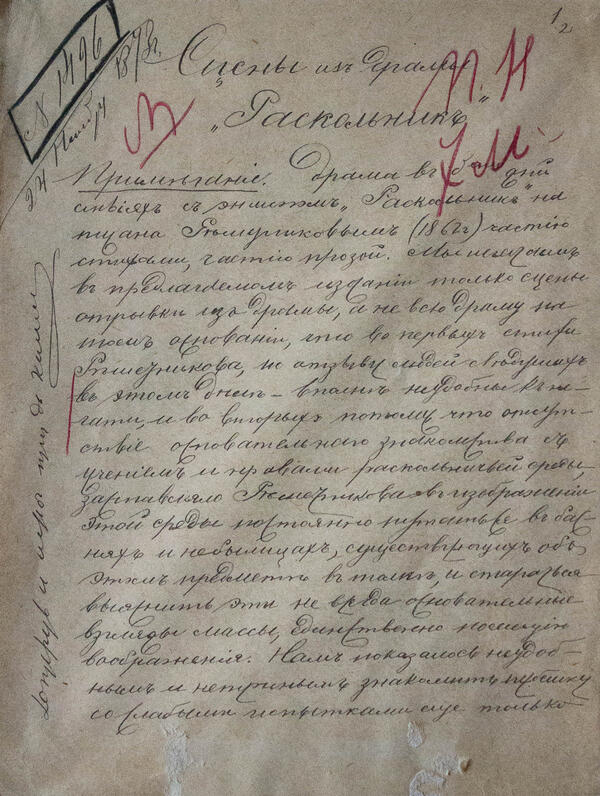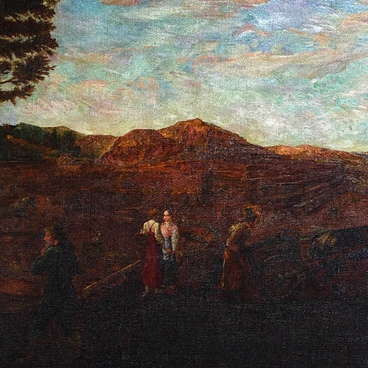Dissenter is a play exemplary of the early period of Fyodor Reshetnikov’s writing. He was a representative of democratic literature of the 1860s. According to researcher Ivan Skvortsov, Reshetnikov managed to record idiosyncratic historical processes in the Urals and Siberia. Back in the 18th century, dissenters fled central Russia and began to explore the country’s outskirts, forming dissenters' monasteries. The Urals seemed attractive due to the development of the mining industry. There were many gifted masters among dissenters who were famous for their work at the factories of Olonetsk. In the 1820s, engineer Wilhelm de Gennin, with the permission of Peter the Great, brought a large group of dissenters to the Urals and arranged their settlement in Shartash.
In his play, Fyodor Reshetnikov shows the lives of workers who were constantly being punished by factory chiefs and police authorities. The theme of dissent is revealed through the lead character, Thomas. Ivan Veksler, a literary scholar, suggested that Reshetnikov began to collect material for the play at the end of 1861, and that the writer finished Dissenter late in February, 1862. The play was edited by writer Gleb UspEnskiy with detailed comments. According to the editor, he selected ‘episodes that take place in a mining plant, with workers… [episodes] where Reshetnikov demonstrates great expertise’. The rest ‘better not be published’, he included into an abridged version.
In 1873, Uspenskiy submitted ‘Episodes from Dissenter’ to the Moscow Censorship Committee to be considered. The Committee decided ‘Ban and leave it in the Committee’s files’. The manuscript of the play was returned to Reshetnikov’s wife. In 1874 she submitted it to the Academy of Sciences for the 18th Uvarov award.The manuscript was reviewed by the academy professor Aleksander Nikitenko who wrote in his review ‘Dissenter. It is a passage with a beginning and no end; its content is borrowed from the commoners' lives’.
The first time book titled ‘Episodes from Dissenter, play by F. M. Reshetnikov, notes by G. I. Uspenskiy’ was published in 1917 in the NEvsky almanac. In 1948, a complete collection of Reshetnikov’s writings was published and edited by Ivan Veksler. The play was not altered.
In his play, Fyodor Reshetnikov shows the lives of workers who were constantly being punished by factory chiefs and police authorities. The theme of dissent is revealed through the lead character, Thomas. Ivan Veksler, a literary scholar, suggested that Reshetnikov began to collect material for the play at the end of 1861, and that the writer finished Dissenter late in February, 1862. The play was edited by writer Gleb UspEnskiy with detailed comments. According to the editor, he selected ‘episodes that take place in a mining plant, with workers… [episodes] where Reshetnikov demonstrates great expertise’. The rest ‘better not be published’, he included into an abridged version.
In 1873, Uspenskiy submitted ‘Episodes from Dissenter’ to the Moscow Censorship Committee to be considered. The Committee decided ‘Ban and leave it in the Committee’s files’. The manuscript of the play was returned to Reshetnikov’s wife. In 1874 she submitted it to the Academy of Sciences for the 18th Uvarov award.The manuscript was reviewed by the academy professor Aleksander Nikitenko who wrote in his review ‘Dissenter. It is a passage with a beginning and no end; its content is borrowed from the commoners' lives’.
The first time book titled ‘Episodes from Dissenter, play by F. M. Reshetnikov, notes by G. I. Uspenskiy’ was published in 1917 in the NEvsky almanac. In 1948, a complete collection of Reshetnikov’s writings was published and edited by Ivan Veksler. The play was not altered.



